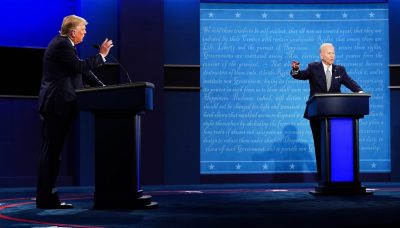The Foreign Policy Election that Ignored Foreign Policy
The neglect of foreign policy by the campaigns and the media has been a great disservice to the country.

The 2020 presidential campaigns have ignored foreign policy more this year than in any election since the turn of the century, but the 2020 election will have significant foreign policy consequences no matter the outcome. The neglect of foreign policy by the campaigns and the media has been a great disservice to the country, since the president wields such extensive power in this area. The choices that a president makes can have devastating effects on tens of millions of people in other countries, and they can sometimes impose huge costs on the United States.
By all rights, foreign policy should account for the majority of what presidential candidates talk about, because it is such a large part of what presidents do once in office, but the public’s lack of interest has created incentives for the candidates and journalists to pay it as little attention as possible. It is no wonder that we have no accountability in foreign policy when foreign policy plays such a small part in the process of selecting a president.
If Trump defies the odds and wins re-election, he will take it as a vindication for his destructive unilateralist policies, and he will presumably be more aggressive in pursuing those policies in a second term. The national security team in a second Trump term will likely be a Who’s Who of the worst hard-liners, possibly including Ric Grenell, Tom Cotton, and Lindsey Graham. A Biden win will in all likelihood lead to an attempt to revive a pre-2016 consensus that was already hollowed out and discredited by the failures of the last two decades.
There will therefore be some major differences in policy depending on the outcome. A Biden win might mean more confrontational policies toward Russia and North Korea, while a Trump victory would all but guarantee continued relentless hostility toward Iran and Venezuela. Tensions with China seem likely to increase in different ways no matter which candidate prevails. Neither candidate is offering foreign policy restraint as we understand it, but a Biden administration might at least be open to some ideas from restrainers. A second Trump term seems likely to be dominated even more by the president’s loyalists and the hard-liners he has surrounded himself with for the last four years.
The final presidential debate included some brief discussion of foreign policy broadly defined, but almost all of that time was consumed by mutual accusations of corruption and taking foreign money. Voters have never heard a substantial exchange of views between the candidates on what they would do overseas in the next four years, because the candidates prefer not to talk about it and no one seems inclined to ask them. Other than attacking Trump over engagement with North Korea and the dubious Russian bounty story, Biden has said very little recently about specific Trump policies that he opposes. During the primaries, we heard some commitments from him that he would treat the Saudis like pariahs, end U.S. involvement in the war on Yemen, and reenter the nuclear deal with Iran, but there has been precious little discussion of the other wars that the U.S. continues to wage in at least half a dozen countries. Other than boasting about the Israel normalization agreements that have been concluded in recent months, Trump has said very little about his record because there is so little to tout.
The candidates’ reticence is understandable. Biden’s foreign policy record is hardly awe-inspiring, and at different points he has taken some awful and misguided positions. His vote to authorize the invasion of Iraq is well-known, and it stands out as the worst decision in his career, but we shouldn’t forget that he has been a consistent and vocal backer for NATO expansion, including in Ukraine and Georgia. Adding these countries to the alliance in the near future is very unlikely, but it does not bode well for our government’s Russia policy that the next president could be one of the biggest cheerleaders for this terrible idea. He has repeatedly poured cold water on the idea of engagement with North Korea, and he sticks to an outdated demand for denuclearization that North Korea is never going to accept.
On the plus side, Biden reportedly advised against intervening in Libya, and he opposed Obama’s surge in Afghanistan, but he lost those internal battles and can’t easily criticize those policies without impugning the judgment of the man who chose him to be vice president. If he becomes president, he will be able to get his way, but it is anyone’s guess whether he will follow his more cautious instincts or indulge his more conventional hawkish views. The names being floated as possible choices for Biden’s national security team don’t inspire confidence that it will be the former.
Trump’s foreign policy record has little to recommend it, especially for those interested in restraint. He has made a mockery of real diplomacy with photo-op summits and Potemkin agreements, and at the same time he has thrown up as many roadblocks as possible to impede meaningful negotiations with Iran in the future. Few presidents have talked so much about making deals while delivering so few. The failure to extend New START is a case in point. Even though it would have been very easy, and it would have put some meat on the bones of his promise to cooperate with Russia, he has dithered and dragged his feet with the apparent goal of letting the treaty die. The president has refused to take the foreign policy equivalent of a lay-up because it would require him to acknowledge that his predecessor may have been right about at least one thing. The rest of his arms control agenda amounts to tearing up one treaty after another and inviting a new arms race in Europe.

